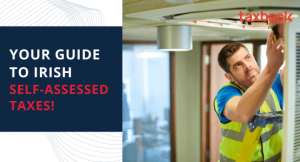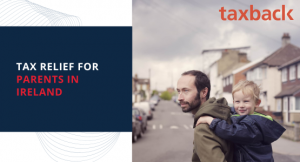How to become financially fit this year: top tips and strategies
Thinking of financial fitness as this year's goal or want to become more financially fit in general?
Just like other aspects of your health, at Taxback we know that financial wellbeing is critical to everyone's overall health.
That’s why in this article we’re going to cover some top tips on how you can become financially fit!
What does it mean to be financially fit?
First things first, let’s define financial fitness…
Financial fitness is having control over your finances and making informed decisions about how you spend and save your money.
It involves the following:
- Managing your money effectively
- Having savings
- Living within your means
It’s essentially about ensuring that you’ll have a financially secure future.
Set specific financial goals
The first step towards financial fitness is setting financial goals. The reason it’s important to set financial goals is because you can easily get off track and lose motivation if you don’t.
Your financial goals should be SMART - specific, measurable, actionable, realistic and time-specific. This means that they should be in line with the reality of your financial situation.
For example, you can’t plan to save €10,000 a year when all you can save based on your budget a month is €100, as this would bring you to €1,200 a year. Therefore, it’s important to save based on your budget.
Start by creating a list of:
- Short-term goals - achievable in one or two years
- Midterm goals - achievable in two to five years
- Long team goals - achievable in five or more years
Some examples of short-term goals are paying off credit card debt or building an emergency fund, while mid-term goals can include saving for a house or a car.
Some examples of long-term goals are saving for retirement or your children's education.
Some important parts to planning your financial goals are:
- Create a list of each goal and determine how much money you need to save monthly to achieve those goals
- Set a realistic deadline and consider if it’s realistic to achieve that financial goal within the given amount of time
- Once you create your plan and put it to action, make sure you monitor your progress along the way and if you need to, make adjustments as required to achieve your goals
Remember setting financial goals is an important first step in becoming financially fit!
Create a budget
To become financially fit, you have to be in control of your money, which means knowing how much money is coming in and how much money is going out. That’s where creating a budget comes in!
Creating a budget is helpful because it will help you achieve your financial goals while also allowing you to treat yourself.
The whole point of setting a budget is so that your expenses don’t exceed your income and that you live within your means.
Here are some helpful steps for creating a budget:
- First take into account all the income that you have coming in, whether that be weekly or monthly, and note this down
- Next, break down your expenses into essential and non-essential expenses
Essential expenses are the ones you need to pay in order to live. E.g. food, housing, transport, etc.
Non-essential expenses are spending money on wants rather than needs. E.g. dining out, entertainment, and gym membership.
- You want to list all of your expenses, both essential and non-essential, and add up how much you’ll be spending on your expenses in total
- Now you need to minus your income amount from your expenses
If your expenses are higher than your income, you need to make some adjustments to your budget, so that you reduce the amount you’re spending.
On the other hand, if your income is higher than your expenses, you can allocate money to savings, which is the next point we’ll be focusing on.
The average Irish tax refund is €1,880
Save what you can!
Savings are an important part of the conversation when it comes to being financially fit. Even saving a small amount can make a difference!
There are plenty of things you can save for, whether it be a household item, a home, or an emergency fund.
Planning for the unexpected is important and this will help to make you feel more secure for the future.
Although everyone’s saving situation is different, there is a common rule you can use to save known as the ‘50/30/20 rule’.
The 50/30/20 rule suggests spending 50% of your income on your needs, like rent, groceries, and other essential expenses, 30% on your wants, like entertainment, hobbies, and travel, then 20% can be for savings.
You could save for an emergency fund, long-term goals like retirement or a home, or pay any debt you have.
Setting a goal to save three to six months' worth of expenses is another thing you can do. You can also consider opening a retirement account to save for your retirement (it’s never too early!).
Remember the 50/30/20 rule is just a guide and everyone’s situation can be different but saving any amount will make a difference on your journey to becoming financially fit.
Maintain a steady lifestyle
The next point is crucial for your financial fitness journey - maintaining a steady lifestyle despite your income increasing.
This means avoiding spending the extra money you may have made through a promotion, inheritance, or a bonus.
A steady lifestyle is all about making wise financial decisions and avoiding unnecessary expenses.
This is not to say that it’ll be easy, especially when you’ve got extra money in your pocket but this is where being disciplined, patient, and having a long-term mindset come in.
For example, when you have some extra money your first thought may be to upgrade your car, move to a bigger home, or go on an expensive holiday, but these decisions can impact your financial health long-term, especially if they’re things you don’t need. Instead, it’s best to focus on maintaining a consistent standard of living.
That’s not to say that you shouldn’t treat yourself!
Here’s where you may wonder, can I get financially fit and still do the things I love to do?
Absolutely!
Being financially fit doesn't mean you have to stop spending money on the things you enjoy doing, instead, it’s about finding the balance between doing things you enjoy and being responsible with your finances.
For example, say you love travelling, you can spend your finances responsibly by planning your trips in advance and choosing more affordable destinations and accommodations.
Similarly, if you enjoy dining out, you can still indulge in your favourite restaurants while being mindful of your budget. What you can do is set a monthly limit on how much you spend on dining out and look for happy hour specials or deals in your favourite restaurants.
So as you can see a balance is key to achieving long-term financial fitness!
The average Irish tax refund is €1,880
Invest in yourself and your future
It’s often said that your most valuable asset is yourself and it makes sense because if you think of yourself as a financial asset, you will build a financially secure future for yourself.
By investing in yourself, you can increase how much you earn and create new opportunities for yourself.
Here are some ideas of how you can invest in yourself:
-
Enrol in a course
-
Attend workshops or conferences
As well as gaining knowledge, conferences and workshops can help build connections which can lead to new job opportunities or even just simply exchanging ideas.
-
Hire a mentor or a coach who can help direct you with your future career and goals
By focusing on your personal growth and investing in yourself, you will be well on your way to becoming financially fit for the foreseeable future.
Obtain knowledge and advice
As the saying goes “knowledge is the key to success”, and it’s no different when it comes to becoming financially fit.
Educating yourself on the topic of personal finances is important because it’ll help you make more informed decisions in the following areas:
-
Budgeting
-
Saving
-
Investing
-
Managing debt
There is so much information out there when it comes to getting educated on your finances!
You can read books, attend webinars and conferences, or take courses.
By doing some of these things, you can enhance your financial literacy and help you to make better financial decisions.
Moreover, you can seek guidance from financial experts. For example, Ireland has a money advice service known as MABS. With these types of services, you can learn about managing your money, tackling debt and more. This is just one example of the many services there available.
In our rapidly changing world, obtaining knowledge and advice is essential for attaining long-term financial fitness.
Manage your taxes
It may or may not be mandatory to file your taxes early based on where you live.
Regardless, filing your taxes is important for a variety of reasons, including the potential for both owing money and receiving a tax refund.
You may be due a tax refund, hooray! Using this refund to boost your savings or use it as funds for other expenses is a great way to boost your financial fitness.
However, if there is a possibility you might owe money once you file your tax return, ensure you set money aside to avoid being overwhelmed with a large bill at the end of the tax season.
Also note if there is a deadline for when you should file your taxes, ensure you file on time so that you don’t incur any penalties.
The average Irish tax refund is €1,880
Need help to file your taxes?
Taxback is here to help! We provide tax return filing and tax refund services globally.
Many people end up paying too much tax because they don’t understand their entitlements, but when you use Taxback that won’t be the case!
Our certified team of tax experts are dedicated to helping you file correctly, ensuring full compliance with Revenue while ensuring you receive your maximum Irish tax refund.
By using Taxback, you’ll ensure peace of mind and more money in your pocket!
Get started with Taxback today!







